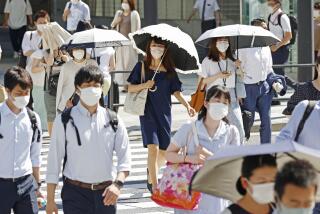Shanghai Gives Foreign Firms Dibs on Power
General Electric Co., Bayer and other multinational companies operating in Shanghai are being given top priority by city officials when it comes to their power supplies as the peak summer demand period threatens shortages.
Shanghaiâs power demand may rise as much as 15% from a year ago during this yearâs peak period, from today to Sept. 17, according to the city governmentâs website. Shanghai had its hottest summer in 60 years in 2003, causing power shortages as air conditioners were turned on in shops, factories and homes.
The city wants to avoid a repeat of last yearâs blackouts -- which affected an industrial park where General Motors Corp. makes cars and NEC Corp. produces computer chips. At stake is investment by 34,000 foreign companies that recently reached $50 billion and accounted for more than 60% of Shanghaiâs $48.5 billion of exports last year.
âPower supply to foreign companies, especially those in the preferred industries, will be guaranteed,â Yu Beihua, deputy director of the Shanghai Development and Reform Committee, said last week. He didnât identify the preferred industries. Said Shanghai Vice Mayor Zhou Yupeng: âThis summer our priority targets for electricity are the foreign-invested enterprises.â
The power shortage issue weighs on the minds of many investors. The China unit of Marubeni Corp., Japanâs fifth-largest trading company by revenue, said it suffered losses because of the blackouts last summer that halted production.
âWe are very worried about a power shortage as it is very dangerous as a sudden stoppage could cause explosions,â said Tadao Manabe, president of Marubeni China. âLast year we had to stop work two to three times a week, with only a few minutesâ warning each time. Sometimes we didnât even get a warning.â
Marubeni plans to create a company in Shanghai by August to bring together its chemicals units in other parts of China, Nikkei English News reported Wednesday, without saying where it got the information. The company will manage sales of chemical products including resins and fiber.
Elmer Stachels, chief executive of China for Bayer, said the company was considering building its own generators. Bayer, which generated $1.3 billion in revenue in China last year, plans to invest $3.1 billion building an integrated production site in an industrial park at Caojing, near Shanghai.
âFor big projects you need to have your own generators as a safety net,â Stachels said.
China faces a power shortage of 60 million megawatt-hours this year, the State Electricity Regulatory Commission said. In the first four months of this year, consumption rose 16.1% to 650.5 million megawatt-hours, while production rose 15.8% to 647.3 million megawatt-hours, the commission said.
During summer, demand for electricity surges as homes and offices switch on their air conditioners. For every 100 Shanghai households, there are 130 units of air conditioners. Air conditioners used about 6,500 megawatts, of which 2,000 megawatts were by residential consumers.
In April, the city government said it planned to invest more than $12 billion by 2010 to double electricity generating capacity. The city plans to buy more than 3,800 megawatts of power from neighboring provinces this year, an increase of more than 50% from a year earlier.
The municipal government has adopted measures, which include shifting production to nights and weekends to stagger demand and raising the price of power to discourage use during peak hours.
âThis year the government aims to restrict industriesâ power usage during the peak season, and wonât cut power suddenly unless there are unexpected emergencies,â Wang Jian, deputy director of the Shanghai Economic Commission, told reporters last week.
More to Read
Inside the business of entertainment
The Wide Shot brings you news, analysis and insights on everything from streaming wars to production â and what it all means for the future.
You may occasionally receive promotional content from the Los Angeles Times.








